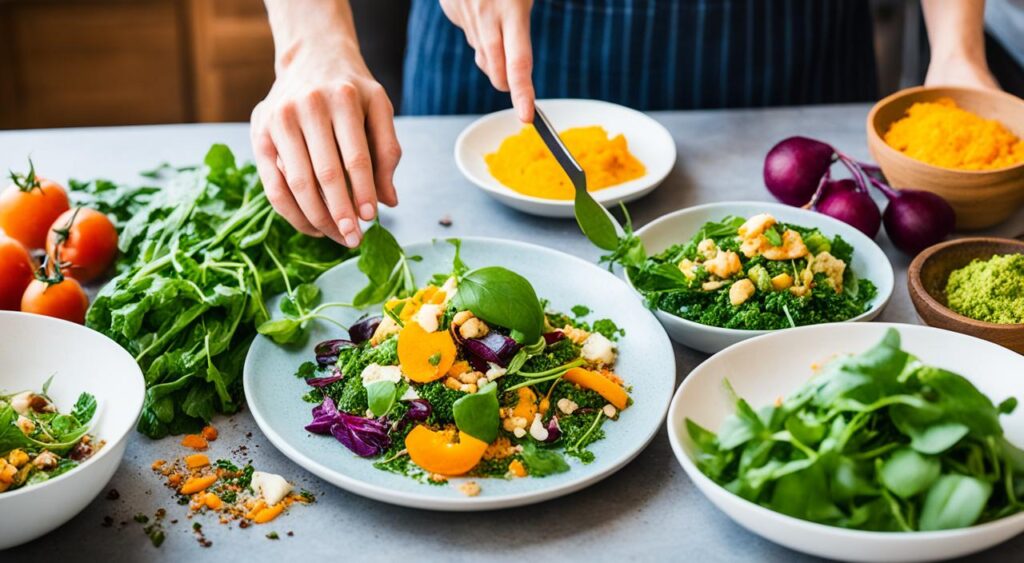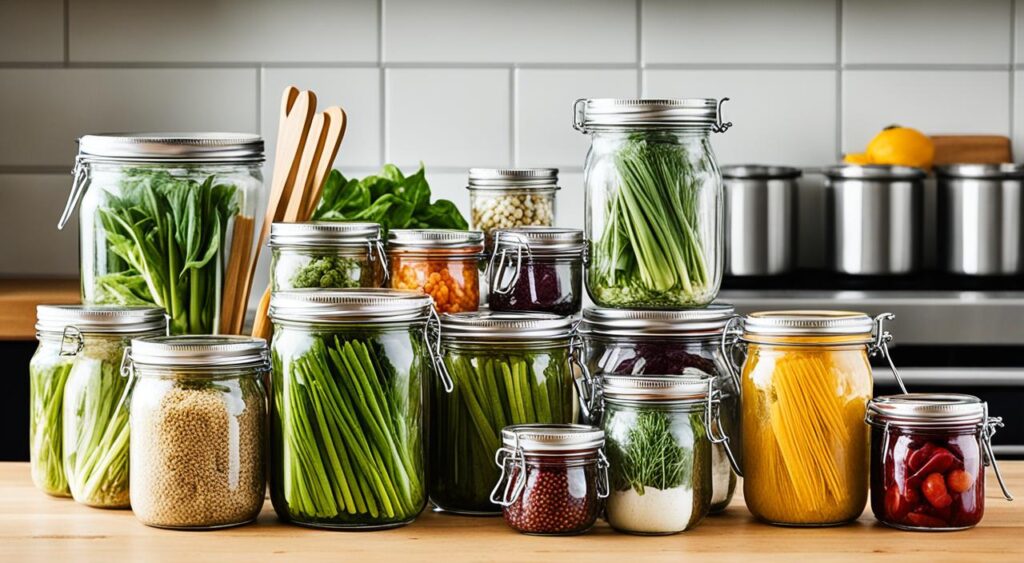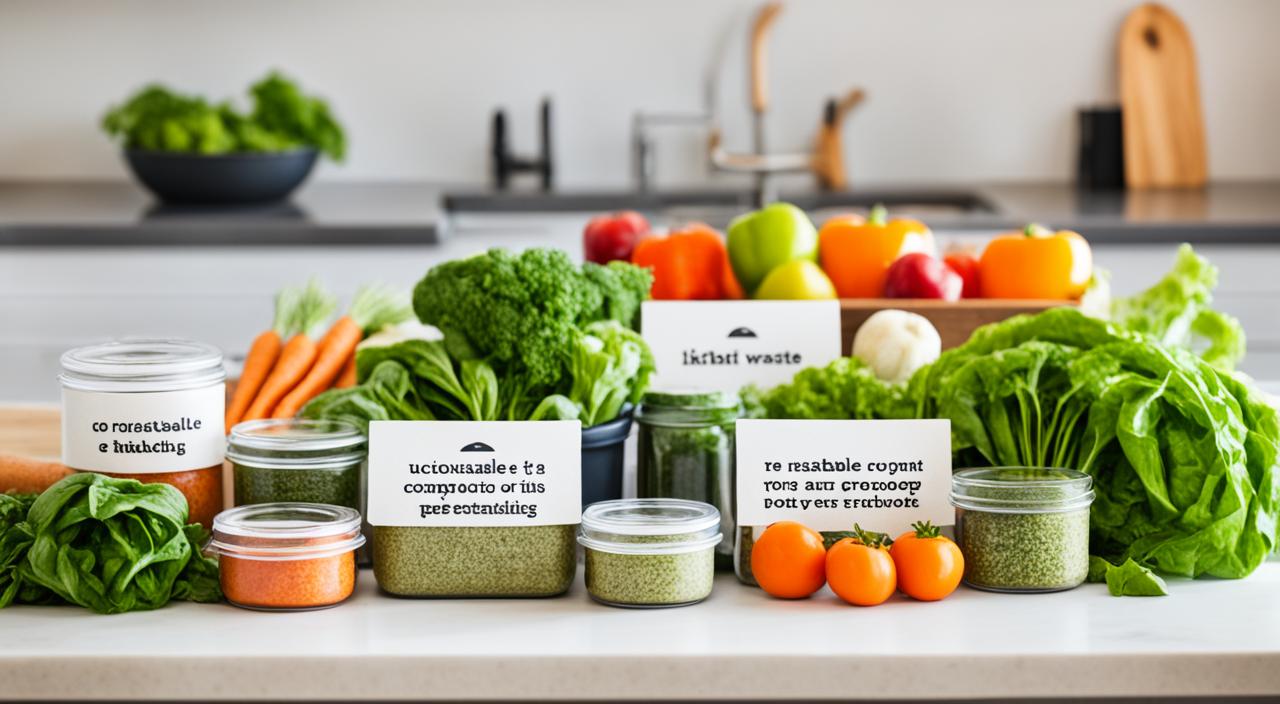In today’s world, where environmental consciousness is paramount, adopting sustainable cooking practices is crucial. This comprehensive guide offers practical zero waste cooking tips and strategies to help you reduce food waste, save money, and create delicious, eco-friendly meals. Discover how to embrace meal planning, shop smartly, get creative with leftovers, and implement mindful kitchen habits for a more sustainable cooking experience.
Key Takeaways
- Develop a weekly meal plan to minimize food waste and save money
- Shop with a reusable grocery list and bags to reduce single-use plastics
- Utilize leftovers and food scraps in creative ways to minimize waste
- Adopt eco-friendly cooking methods like one-pot and slow cooker meals
- Explore sustainable food storage and preservation techniques
Embrace Meal Planning and Smart Shopping
Effective meal planning and strategic shopping are essential for reducing food waste, saving money, and adopting a more eco-friendly lifestyle. By creating a weekly meal plan and shopping with a list and reusable bags, you can streamline your grocery trips, utilize ingredients efficiently, and minimize your environmental impact.
Create a Weekly Meal Plan
Crafting a weekly meal plan is a game-changer when it comes to meal planning. Take a few minutes each week to jot down your family’s favorite meals, consider what ingredients you already have on hand, and build a plan that maximizes the use of your pantry and fridge. This not only helps you reduce food waste but also saves you time and money by preventing last-minute trips to the store.
Shop with a List and Reusable Bags
Before heading to the grocery store, make a comprehensive shopping list. This will help you stay focused and avoid impulse purchases that can contribute to food waste. Additionally, bring your own reusable bags to the store. Not only does this reduce the use of single-use plastic bags, but it also encourages you to be more mindful of your eco-friendly shopping habits.
“Meal planning and smart shopping are the foundations of a zero-waste kitchen. With a little preparation, you can save money, reduce your environmental footprint, and enjoy delicious, home-cooked meals.”
By embracing these simple yet effective strategies, you can take a significant step towards a more sustainable and eco-conscious lifestyle. Meal planning and smart shopping are the keys to unlocking a world of savings and environmental responsibility.
Reduce Food Waste with Creative Solutions
In the pursuit of a sustainable, zero-waste lifestyle, finding innovative ways to utilize leftovers and repurpose food scraps is key. By tapping into the boundless potential of these culinary resources, you can not only reduce food waste but also save money and create delicious, nourishing dishes.
Utilize Leftovers and Scraps
Don’t let those extra servings or leftover ingredients go to waste. Instead, get creative and transform them into new, flavorful meals. From turning extra rice into fried rice or arancini to repurposing roasted veggies in soups and casseroles, the possibilities are endless. Explore leftover recipes and zero-waste cooking techniques to breathe new life into your culinary creations.
When it comes to repurposing food scraps, the options are just as diverse. Carrot tops, beet greens, and even vegetable peels can be transformed into nutritious pesto, soups, and snacks. Reduce food waste by getting creative with leftover recipes and finding ways to repurpose food scraps.
“Creativity is the key to reducing food waste. With a little imagination, you can transform your leftovers and scraps into delicious, nourishing meals.”

By embracing a zero-waste cooking mindset and finding creative solutions to reduce food waste, you’ll not only save money but also contribute to a more sustainable future. Explore the boundless possibilities of leftover recipes and repurposing food scraps to elevate your culinary skills and minimize your environmental impact.
Zero Waste Cooking: A Mindful Approach
Embrace a more conscious and eco-friendly approach to cooking by adopting zero waste principles. Zero waste cooking involves being mindful of your food consumption, preparation, and disposal habits, ultimately reducing your environmental impact. By implementing sustainable kitchen practices, you can minimize waste and support a greener lifestyle.
One key aspect of zero waste cooking is proper food storage. Utilize airtight containers, reusable bags, and freezer-friendly options to extend the shelf life of your ingredients. This not only reduces food waste but also prevents unnecessary packaging from ending up in landfills.
Another essential element of mindful cooking is conscious consumption. Avoid impulse purchases and plan your meals in advance, ensuring you only buy what you need. When shopping, opt for bulk bins, refillable containers, and local, seasonal produce to minimize packaging waste.
- Prioritize purchasing from bulk bins and refillable containers to reduce single-use packaging
- Choose local, seasonal produce to support sustainable agriculture and minimize transportation emissions
- Plan your meals in advance to avoid impulse purchases and food waste
By embracing a zero waste mindset in the kitchen, you can make a significant contribution to a more sustainable future. Remember, every small step towards mindful cooking and eco-friendly practices can have a meaningful impact on the environment.
| Sustainable Kitchen Practices | Benefits |
|---|---|
| Proper food storage | Extends shelf life, reduces food waste |
| Conscious consumption | Minimizes unnecessary purchases, packaging waste |
| Utilizing leftover ingredients | Reduces food waste, promotes creativity in the kitchen |
“The greatest waste of our natural resources is the waste of human lives and talents.” – Phil Donahue
By embracing a mindful approach to zero waste cooking, you can reduce your environmental impact, save money, and inspire others to adopt more sustainable kitchen practices. Remember, every small step towards a greener lifestyle can make a lasting difference.
Rethink Food Storage and Preservation
In the quest to reduce food waste and promote eco-friendly kitchen practices, it’s essential to rethink your approach to food storage and preservation. By mastering proper refrigeration and freezing techniques, as well as exploring the benefits of canning and dehydrating, you can extend the shelf life of your ingredients and keep your food fresher for longer.
Proper Refrigeration and Freezing Techniques
Proper storage is the key to minimizing food waste. Start by organizing your refrigerator and freezer, ensuring that you are optimizing the available space and maintaining the ideal temperature for food preservation. Follow these tips for effective refrigeration and freezing:
- Group similar items together to maintain consistent temperatures.
- Use airtight containers or resealable bags to prevent moisture loss and freezer burn.
- Label and date all items to keep track of expiration dates.
- Rotate your stock, placing newer items behind older ones to ensure everything is used in a timely manner.
Explore Canning and Dehydrating
In addition to refrigeration and freezing, consider incorporating canning and dehydrating into your food preservation arsenal. These methods not only extend the shelf life of your ingredients but also provide a more eco-friendly alternative to store-bought processed foods.
| Method | Benefits |
|---|---|
| Canning | Preserves the freshness and nutrients of fruits, vegetables, and even meats, allowing for long-term storage without refrigeration. |
| Dehydrating | Removes moisture from food, creating shelf-stable and lightweight ingredients that can be easily incorporated into a variety of dishes. |
By embracing these sustainable food storage and preservation techniques, you can reduce food waste, save money, and enjoy the convenience of having a well-stocked eco-friendly kitchen.

Sustainable Cooking Methods and Recipes
Elevating your zero waste cooking journey doesn’t have to be complicated. By embracing sustainable cooking methods and incorporating nourishing recipes, you can reduce your environmental impact while enjoying delicious, wholesome meals. Let’s explore the benefits of one-pot and slow cooker meals – two versatile approaches that minimize waste and maximize flavor.
One-Pot Meals: Streamlining Sustainability
One-pot meals are a game-changer when it comes to sustainable cooking. These all-in-one dishes not only reduce the number of dishes you need to clean but also conserve energy by utilizing a single cooking vessel. From hearty stews and casseroles to flavorful rice and pasta dishes, one-pot meals allow you to create complete, waste-reducing meals with ease.
Slow Cooker Sensations
The slow cooker is another invaluable tool in the sustainable cook’s arsenal. By simmering ingredients at low temperatures over an extended period, slow cooker meals lock in flavors and nutrients while minimizing energy consumption. Whether you’re whipping up a mouthwatering chili, a tender roast, or a comforting soup, the slow cooker’s hands-off approach allows you to enjoy delicious, zero waste recipes with minimal effort.
Embracing these sustainable cooking methods not only reduces your environmental footprint but also simplifies your meal preparation, allowing you to spend more time enjoying the process and savoring the results. Explore a variety of one-pot meals and slow cooker meals to kickstart your zero-waste culinary adventures.
“Cooking is at once child’s play and the adult’s responsibility. Professionalism is all very well, but there is also a comfort in the simple things.”
– Laurie Colwin
Reduce Packaging and Single-Use Items
In the pursuit of a more sustainable and eco-friendly kitchen, reducing your reliance on packaging and single-use items is a crucial step. By opting for bulk bins and refillable containers, you can not only minimize waste but also save money and reduce your environmental impact.
Embrace Bulk Bins and Refillable Containers
When shopping for your zero waste kitchen, seek out stores that offer bulk bins for common pantry staples, such as grains, beans, nuts, and spices. This allows you to purchase exactly the amount you need, reducing unnecessary packaging and food waste. Additionally, invest in reusable containers, jars, and bottles that you can refill with these bulk items, further minimizing your need for single-use packaging.
To maximize the benefits of this approach, create a shopping list and plan your meals in advance. This will help you determine the precise quantities you require, ensuring you don’t overbuy and end up with leftover ingredients that may go to waste.
Remember, reducing packaging and single-use items is not only good for the environment but can also save you money in the long run. By embracing this eco-friendly shopping mindset, you’ll contribute to a greener, more sustainable future while enjoying the convenience and cost-savings of a zero waste kitchen.
| Packaging Reduction Strategies | Benefits |
|---|---|
| Bulk Bins | Reduces waste, saves money, allows you to purchase exact amounts |
| Refillable Containers | Minimizes single-use packaging, encourages sustainable shopping habits |
| Meal Planning | Helps determine precise quantities, reduces food and packaging waste |
“By reducing packaging and embracing bulk bins and refillable containers, you can significantly lower your environmental impact while saving money and decluttering your kitchen.”
Conclusion
In the journey of embracing sustainable zero waste cooking, you have discovered a wealth of practical tips and strategies to reduce food waste, save money, and cultivate a more eco-friendly lifestyle. By implementing the insights shared in this comprehensive guide, you can become a mindful, waste-conscious cook, making a positive impact in your kitchen and the environment.
From planning meals and shopping smartly to utilizing leftovers and exploring creative preservation techniques, you have learned how to minimize waste and optimize your culinary practices. The shift towards sustainable cooking methods and recipes, coupled with the reduction of packaging and single-use items, empowers you to make a tangible difference in your daily life.
As you continue on this rewarding path of zero waste cooking, remember that every small step you take contributes to a more sustainable future. Embrace the mindset of mindfulness, creativity, and resourcefulness, and inspire others around you to join the movement towards a eco-friendly living. Together, we can create a more sustainable, waste-conscious world, one delicious meal at a time.

